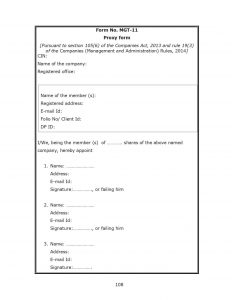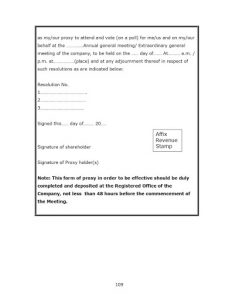This article is written by Sukruti Khandelwal, pursuing Diploma in General Corporate Practice: Transactions, Governance and Disputes from Lawsikho.
Table of Contents
Introduction
The term ‘proxy’ is used in two ways under the Companies Act, 2013. The first refers to the individual appointed by a member to attend and vote in the meeting on his behalf as a representative. The other refers to the instrument/ document by which such an individual is appointed as a proxy. The facility of proxy allows a member to vote in a meeting which he personally cannot attend due to any reason. The concept of proxy is extensively dealt with under Section 105 of the Companies Act, 2013, Rule 19 of the Companies (Management and Administration) Rules, 2014, and Point 6 of Secretarial Standards-2 (SS-2). Although, the Articles of private companies may contain different provisions for proxy than these statutes; this is according to MCA Notification dated 5-6-2015.
As far as history is concerned, common law never recognized voting by proxy. It was only when Articles of Association of a company conferred a right to vote by proxy, this became a contractual right. It was first statutorily recognized under Section 79 of the Companies Act, 1913 as amended in 1936. Then, it was recognized under Section 176 of the erstwhile Companies Act, 1956. Now, Section 105 of the Companies Act, 2013 deals with proxies.
In this article, the fundamental aspects related to proxies such as appointment, form, statutory procedure and requirements, and rights/liabilities have been covered in depth. The article attempts to paint a comprehensive picture of the subject.
Appointment of a proxy
Under Section 105(1) of the Companies Act, 2013 (hereinafter, CA), any member who is entitled to attend and vote in a company meeting can appoint a proxy. However, a proxy cannot be appointed by a member of a company not having a share capital unless the Articles provide for it. The government can also prescribe a class or classes of companies that may not allow its members to appoint a proxy.
A proxy can represent not more than 50 members whose aggregate shareholding carrying voting rights must not exceed 10%. In case a member has more than 10% shareholding carrying voting rights, then the proxy for this member cannot represent anybody else. As per 6.1 of the Secretarial Standard on General Meetings, if a proxy is appointed for more than 50 members, he has to choose and confirm 50 members before the inspection period starts. If he does not confirm, he will be appointed proxy for the first 50 members, and the other proxies (instruments) would be declared invalid.
Apart from this, if the member of a company is a body corporate or the President of India or the Governor of a state, then such member’s authorized representative is empowered to appoint a proxy under his/her signature.
Notice of the meeting
Under Section 105(2) of the Companies Act, the notice of the meeting must contain a statement that a member who is entitled to attend and vote in the concerned meeting may appoint a proxy, and that the proxy need not be a member of the company. The statement must appear with reasonable prominence in the notice. This is applicable to Companies having a share capital, or those companies whose Articles permit voting through proxy. In addition to this, as per Rule 19(1) of the Companies (Management and Administration) Rules, 2014, a member of a company can only appoint another member of the same company as a proxy.
Any violation in complying with the requirements of the statement in the notice of the meeting [Section 105(2)] would attract a penalty of INR 5000 each on the defaulting officers of the company.
Instrument of proxy
According to Rule 19(3) of the Companies (Management and Administration) Rules, 2014, the appointment of a proxy has to be in Form No. MGT.11. According to Section 105(6) of CA, this instrument must be in writing and has to be signed by the appointer or his duly authorised attorney. In case a body corporate is the appointer, then the form must be under its seal, or signed either by its officer or duly authorized attorney.
As per 6.3 of SS-2, the form must also be properly stamped under the applicable law. Unstamped or inadequately stamped or uncancelled stamp proxies are invalid. The form that does not contain the proxy’s name is invalid. Similarly, a proxy form without a date is also invalid.
If multiple proxies are received for the same member, then the proxy bearing the latest date would be valid. However, if these proxies either have the same date or no date, then all of them would be declared invalid. This is according to 6.5 of SS-2. There are two important precedents on this as discussed below.
In the case of Virender Kumar Goel v. Raghu Raj, a question arose whether the proxies that have been executed last by the members would prevail over those executed earlier regardless of the date on the instruments. It is already a settled position of law that in case of multiple proxies given by the same member, the proxy bearing the latest date would supersede the earlier ones. Therefore, the court ruled;
“Once the blank proxy without date has reached the hand of the appointee, it can safely be presumed that an authority was given to him to fill up the blanks with his own name or the name of any other person with date and to use the proxy for the purpose of voting at the meeting…If a shareholder signs the proxy in blank, it is his own fault, he should be careful enough not to do so. Once the proxy has been properly filled up on a particular date by the person to whom it is entrusted, the later date has to be taken as the date of signing of the proxy by the shareholder, even though another appointee may also be in possession of a blank proxy of the same shareholder, of prior date.”
In another case of B. Ramachandra Adityan v. Tamilnad Mercantile Bank Shareholders’ Welfare Association, it was held that when two proxy holders stake rival claims, the Chairman of the meeting has only two options, either to contact the concerned member and get his confirmation, or take a decision on the spot on the basis of the forms, if unable to contact that member. While exercising the second option out of necessity, it would not be possible for the Chairman to conduct a roving enquiry at that moment. Therefore, in such circumstances, the Chairman discharges his duties properly if he goes by the date indicated in both the proxies. The Chairman would be legally correct in accepting the form bearing the later date and rejecting both the forms if they have the same date. His decision is binding unless vitiated by fraud or misconduct.
The instrument is valid only for the meeting for which it was created including any adjournment of such meeting. According to Section 105(7) of CA, this instrument cannot be questioned for not complying with any special requirements made in the Articles of the company.
A copy of the form is attached here for reference purposes.
Prohibition on invitation
An invitation issued at the company’s expense to any member, who is entitled to notice of the meeting and vote therein through a proxy, to appoint a person or one of the persons enlisted as a proxy is prohibited under Section 105(5) of CA. So, every officer who permits or authorizes or sends such an invitation would be liable for an INR 50,000 penalty. Be that as it may, the proviso to the same Subsection states that a company’s officer can still issue the proxy form and/or a list of persons willing to act as proxy on the written request of a member, provided that such form and list are available on request to all members entitled to attend and vote.
Deposit of proxy and its authorization
According to 6.6.1 of SS-2, the proxy form has to be deposited either in person or through the post with the company. This has to be done at least 48 hours before the commencement of the meeting. If the Articles of a company require more than 48 hours before the meeting to deposit a proxy, then it would have the effect as if a period of 48 hours has been specified. This is according to Section 105(4) of the CA.
A member who had not appointed a proxy for the original meeting may appoint one for the adjourned meeting if the Articles of the company provide for it. This has to be done not later than 48 hours before the commencement of the adjourned meeting.
A proxy will be accepted on a holiday if the last date of acceptance is a holiday. Identity has to be proved by the proxy on attending the meeting.
Inspection and record of proxies
This is given under Section 105(8) of CA. The request to inspect proxies has to be given in writing by a member entitled to vote at least three days before the meeting. On acceptance of the request, such members can inspect the lodged proxies from 24 hours before the start of the meeting till its conclusion. Inspection will be permitted from 9 AM to 6 PM (business hours) in this period as per 6.8 of SS-2. A fresh request for inspection will have to be filed if the original meeting gets adjourned.
The received proxies have to be recorded chronologically in a register. The reasons for the rejection of a proxy have to be given in the ‘remarks’ column of such proxy’s entry.
Revocation
A relationship of principal and agent exists between the member and his proxy. Such a member can revoke the proxy (agency) as and when he wants before it binds him. The Articles of the company may either impose certain restrictions/limitations on the power of revocation or make proxy irrevocable. However, if the Articles are silent on the issue of revocation, then Section 203 of the Indian Contract Act, 1872 (hereinafter, ICA) that provides for the Right of Revocation would prevail. This was held in S.T. Narayan Chettiar and Anr v. The Kaleeswarar Mills Ltd. and Ors. Moreover, limitation on the exercise of such power under Section 204 of ICA, the entitlement of the agent to compensation under Section 205 of ICA, the effect of revocation on third parties under Section 208 of ICA, and the termination of authority on the death of principal under Section 209 of ICA would also be applicable on the revocation of proxy by a member. This was iterated in B. Ramachandra Adityan v. Tamilnad Mercantile Bank Shareholders’ Welfare Association. This observation is particularly important for private companies that have the autonomy to frame rules for revocation in their Articles as per the 2015 MCA notification.
A proxy can be revoked by many means as provided in 6.7 of SS-2. Generally, a proxy stands revoked when a written notice of such revocation, signed by the member appointing the proxy, is received by the company. This notice has to be given before the meeting commences. In the case of joint membership, the member(s) who signed the proxy must sign the notice of revocation.
A proxy appointed for the original meeting gets revoked when a new proxy is appointed for the adjourned meeting of the original one. Then, the proxy appointed on a later date revokes the one appointed prior to this date.
The right of a member to attend and vote in person is paramount to the right of the proxy. So, if a member attends the meeting despite there being a proxy appointed by him, then the proxy gets revoked if such member votes before his proxy. This was laid down in Knight v. Bulkeley. In such a scenario, the exercise of the personal vote by a member does not revoke the proxy but prevents the exercise of the vote by the proxy.
Rights and restrictions on proxy
There are very limited rights bestowed upon a proxy. He can attend the meeting for which he has been appointed. He can vote in the meeting only on a poll as per proviso to Section 105(1) of CA. If he fulfils the eligibility under Section 109 of CA, then the proxy may even demand a poll as a matter of right.
On the contrary, there are many restrictions placed on the proxy. Firstly, the proxy is not counted for the quorum of the meeting. Secondly, he does not possess any right to speak at the meeting. However, the same may be granted for selected matters by the company’s Articles. Thirdly, he cannot vote by show of hands. Fourthly, he can represent only a limited number of members and shareholding as already discussed above.
Conclusion
The concept of proxy was introduced to facilitate the participation of the shareholders in the affairs of the company even if they cannot attend personally. However, the restrictions placed on the proxy by not allowing them to speak, or not entitled to vote by show of hands renders this motive of participation fruitless. The management’s fear of nuisance or harassment by allowing proxies to speak, though not unfounded, cannot be allowed to become an obstacle for expanding engagement and contribution from these persons. Certain rules and penalties can be included to keep a check on such unruly behaviour.
However, even if voting through the show of hands is permitted, a proxy representing many members would be unable to put forward conflicting interests of these members at once. Voting through the show of hands is feasible only when such a proxy represents a single member or many members with the same interest.
Hence, the need of the hour is to revise these laws relating to proxy to give room for more participation to assist in democratic decision making and better management of the company’s affairs.
References
Students of Lawsikho courses regularly produce writing assignments and work on practical exercises as a part of their coursework and develop themselves in real-life practical skills.
LawSikho has created a telegram group for exchanging legal knowledge, referrals, and various opportunities. You can click on this link and join:
 Serato DJ Crack 2025Serato DJ PRO Crack
Serato DJ Crack 2025Serato DJ PRO Crack













 Allow notifications
Allow notifications


